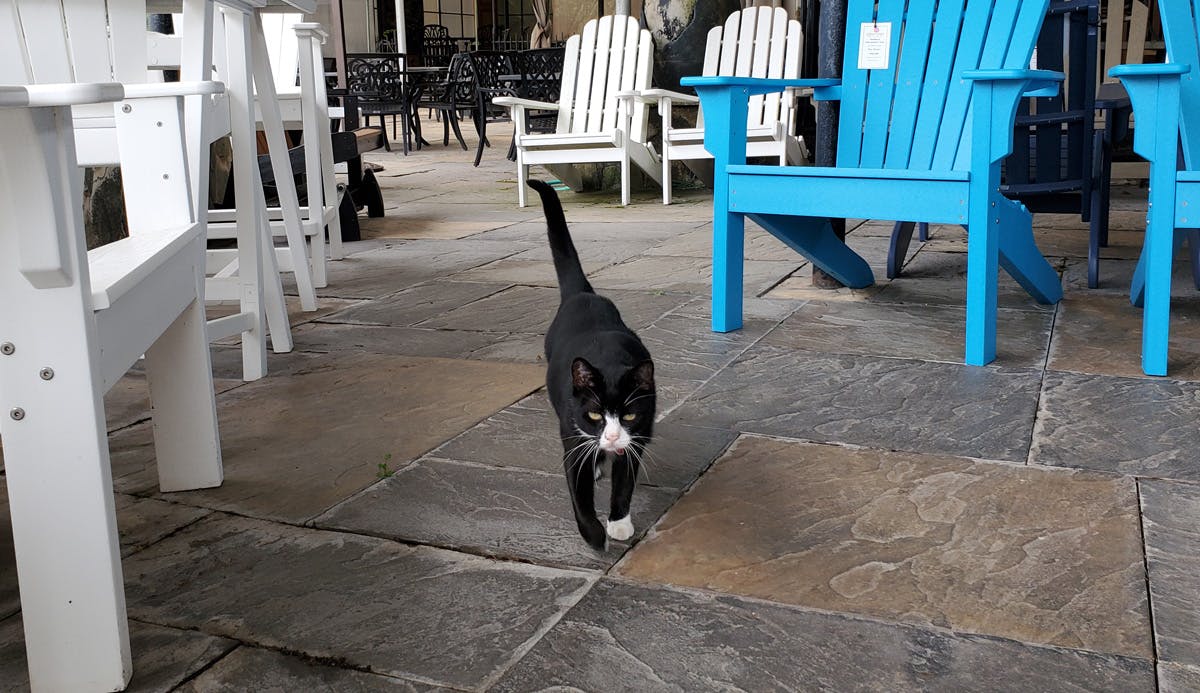
What is a “working cat” anyway?
Working cats (or barn cats) are healthy cats that prefer to live outdoors in and around a barn, workshop or other indoor/outdoor setting. They are typically not socialized enough with humans to live in homes as pets. These cats “work” by keeping rodents under control without the use of chemicals or expensive services. They need shelter, a food source, and they should be sterilized and vaccinated to keep them healthy.
Working cats are the perfect new “hire” for wherever pests interfere with your barn or business. They’re strictly business. And their business is solving your rodent problem.
How much does it cost to adopt one?
The adoption fee is only $10 each for these cats-for-hire. You will also need to provide food, water, shelter, and any necessary vet care should the cat become injured or ill. Humane traps are available to safely capture and transport a sick barn cat to a vet.
What do I do when I bring the cats home?
The SPCA has prepared an excellent handout of tips for introducing your working cat to his or her new job. We will send each working cat home in a carrier and provide adopters with a starter bag of recommended Purina cat food. Adopters need to set up an acclimation crate or space for the first two weeks so that the cats can adjust.
Are they spayed or neutered?
Yes. All Bucks County SPCA working cats are spayed or neutered, vaccinated, microchipped, and treated for worms and fleas. Their ear is also surgically “tipped” so that anyone who sees the cat will know that this cat has already been sterilized.
Are two cats better than one?
Depending on the space and care resources available, one or two working cats are usually the perfect number for most situations. We have both singles and pairs of working cats to place in almost any setting.
Do you have any friendly working cats?
These working cats are not social, friendly cats who desire to be “lap cats” inside your home. They may gain trust in their caregivers over time and may eventually talk to you (meaning they demand their dinner) or allow a rare pat. We strongly encourage adopters to offer cats in this program an independent outdoor life complemented by appropriate care and shelter like a barn or garage. If you are really seeking a house pet, then a working cat is not a good choice.
What do working cats require?
Working cats need access to shelter, such as a barn, shed, stable or garage, and of course food and water. At first, the cat may need to be confined in a tack room or large wire dog crate until used to the new surroundings. Permanent shelters can also be constructed (think little dog houses) out of repurposed insulated coolers that protect the cat from cold or wet weather. We have designs to share and occasionally, actual small shelters to provide to adopters who need them. Working cat owners should have at least one humane live trap on hand for use in safe capture and transport of an injured or ill animal to a private veterinarian for treatment.
Will they bite or attack me?
Working cats don’t want to hurt you; they just want to avoid you! Remember, to a working cat, a human being is as frightening as an alien would be to a person. Attacking or lunging from any cat is extremely rare unless they are sick, distressed or in pain. Do move slowly and be aware when caring for the cats in their introduction crates.
Are working cats a danger to my kids?
Working cats typically run from humans, so children will not get close to them. You should not encourage your children to try to handle them.
Will the cats spread disease?
Our working cats are vaccinated against rabies and cat-specific diseases. They have also been wormed and treated with flea prevention.
We have a dog. Is that a problem for the cats?
This depends on the dog. If your dog is used to being around cats and does not chase or harass them, it can work out well for both species. If your dog sees cats as prey and frequently chases or attacks cats, then a working cat would not be safe in your setting. We recommend keeping dogs away from the cats while they are in introduction crates. Once the cats are released, they will be most active dawn and dusk, when your dog is likely inside the house. We have placed cats successfully with many dog owners.
Will they kill birds?
Studies of outdoor cat diets have shown the majority of animals they catch and eat are rodents and insects. Cats are opportunistic hunters, meaning they go after the easiest prey first, which is usually land-based critters. Cats are essentially rodent specialists. Cats can occasionally catch and kill birds who are on the ground, though, and we recommend taking any birds who are injured by a cat to a licensed wildlife rehabilitation agency.
How will they survive the winter?
Well-cared-for healthy outdoor cats are amazingly resilient to cold temperatures. They grow a very thick coat in the winter. Insulated shelters are generally sufficient to keep them warm and prevent frost-bitten ears. However, outdoor heating pads are an excellent addition for any outdoor cat’s comfort. Cats love them! If you don’t have an electrical hook-up, microwavable Snuggle Safe Disks provide warmth for up to 10 hours. It is also nice to provide a heated water bowl for ice-free water in the winter. Outdoor cats who are thin, sickly, or injured will not survive the winter well, so it is important to have injuries treated promptly and to feed a sufficient diet of high-quality food daily.
Categorized Under: Working Cats